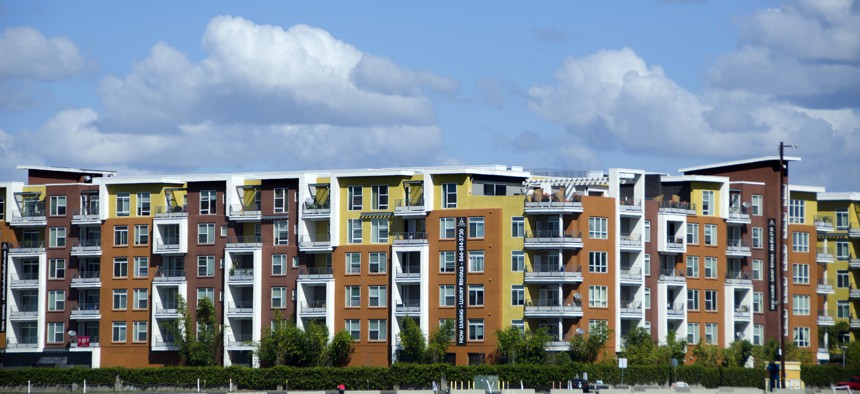Mayors Have Affordable Housing Plans. But Do They Have the Funds?

Mitch Diamond via Getty Images
The short answer is no. But they’re working on it.
While the current housing crisis looks different in communities around the country, there’s one major obstacle local officials agree is preventing the creation of more units: funding. From land banking to hotel conversions, cities are looking for ways to stretch their dollars in the absence of more state and federal dollars, according to city leaders.
Mayors from Richmond, Virginia, to Albuquerque, New Mexico, discussed the issue and a laundry list of other challenges they faced in building affordable housing in their communities in front of a standing-room-only event this week at the U.S. Conference of Mayors’ winter meeting in Washington, D.C.
“Housing is a vaccine for poverty,” said Richmond Mayor Levar Stoney, adding that mayors cannot solve the problem alone and stressing the need for state and federal support.
The 2023 Outlook on Federal Funding
Many cities have plans for addressing the housing shortage, but lack the financial means.
In Albuquerque, there’s a surplus of run-down properties from the ‘60s and ‘70s, hotels that are nearly 100 years old, and commercial spaces that are underutilized in a post-pandemic world, according to Mayor Tim Keller. But despite the poor conditions, purchasing such properties would cost a pretty penny.
“We're getting price gouged by the hotel sellers,” Keller said.
Even if the city overcomes the hurdle of purchasing those properties, it then faces the challenge of converting them to residential spaces. That will be difficult, Keller said, as private-sector construction companies are already strapped.
To help cities like Albuquerque, the Department of Housing and Urban Development has several funding opportunities in the works for 2023, according to Marion McFadden, the department’s principal deputy assistant secretary for community planning and development. These federal funding programs include a $225 million competitive grant program for manufactured housing, $85 million to help communities address barriers to producing and preserving affordable housing, and $75 million for permanent supportive housing projects.
McFadden also encouraged attendees to pay attention to the Section 108 Loan Guarantee Program under the Community Development Block Grant. The loan program provides grantees with up to five times their grant allocation in flexible financing.
Pushing Back on Capital Investors
Mayors also took aim at institutional investors buying up single-family homes, calling them “parasitic” and labeling them as another major obstacle to solving the nation’s housing crisis.
The problem with institutional investors is particularly acute in the South, where about 30% of homes are held by investors that own at least 1,000 properties, said Sarah Brundage, senior advisor to HUD Secretary Marcia Fudge.
In Richmond, investors making cash offers has driven up home prices and increased cases of landlord absenteeism and poor property maintenance. About 87% of evictions in Richmond, Stoney said, are filed by LLCs.
The issue mostly affects people of color for whom the legacies of redlining, where banks avoid lending to racial and ethnic minorities, have already made pathways to homeownership difficult.
“Now, not only will these Americans continue to bear the brunt of these challenges,” Stoney said, “but they'll also be doing so in the market where the housing inventory has been taken over by corporate investors.”
The Black homeownership rate in Richmond is about 32%, compared to the roughly 60% homeownership rate among white residents.
To protect residents from the harms caused by institutional investors, Stoney said, Richmond created an eviction diversion program in 2019 and has since prevented 1,500 households from being displaced.
Other approaches cities could look at in confronting the issue include establishing good cause eviction laws—which prevent tenants from being evicted without good reason—and practicing proactive building code enforcement.
Additionally, cities can help homebuyers with down payment assistance programs and financial education. These actions not only help today’s residents but also address racial disparities in intergenerational wealth.
“Homeownership is one of the fundamental ways for families to build generational wealth,” Stoney said.
Molly Bolan is the assistant editor for Route Fifty.
NEXT STORY: Mayors Fret Over Possibility of ARPA Clawbacks






